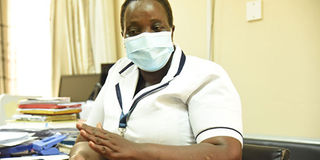Nakuru nurse who braved all to see Covid-19 patients recover

Ms Sarah Mosop, the nurse in Charge of Covid-19 isolation wards at the Nakuru Level Five Hospital speaking on April 23, 2020 about her experience in taking care of patients suffering from the virus. PHOTO | CHEBOITE KIGEN | NATION MEDIA GROUP
What you need to know:
- Stigma within and outside the hospital, she said, built up very fast.
- Ms Mosop says fear of contracting the disease dominated when the first case of the virus was reported.
- Despite all these, the senior nurse said she kept going strong for her two patients.
When the first Covid-19 case in the country was confirmed on March 20, Ms Sarah Mosop, a senior nurse at the Nakuru Level Five Hospital, was apprehensive, knowing that the war would get tough.
Already, the situation in developed countries was dire and kept worsening by the day with healthcare workers dying alongside their patients.
“Covid-19 is not just an ordinary disease like malaria or typhoid and after following closely in the news what was happening in other countries, I knew Kenya was not going to be an island. A lot needed to be done,” Ms Mosop said during an exclusive interview with the Nation on Thursday last week.
FIRST CASE
By the time the first case of the virus was being reported, Ms Mosop says fear of contracting the disease dominated.
Soon, patients suspected to have been infected started trickling in.
“When I was made the team leader, I braced myself for the hardest task. I accepted, because it is what I bargained for when I chose my career and I have always enjoyed taking care of the sick,” she said.
The tough task began when some patients who exhibited Covid-19 symptoms were brought to the hospital and isolated under Ms Mosop’s care.
“Here, everything changed from our usual way of handling other patients with common diseases to being extremely cautious. Our own safety became another key element of our tasks as we made sure that we accorded the patients the care that they needed in order to get better,” she said.
25 YEARS EXPERIENCE
Ms Mosop, who has a 25-year experience, said that for the first two weeks, they experienced a lot of challenges including inadequate personal protective equipment (PPE).
Stigma within and outside the hospital, she said, built up very fast.
The team — two doctors, four clinical officers, 13 nurses, two public health officers and four support staff — Ms Mosop said, felt exposed since there was very low supply of face masks.
On April 1, two of the patients under her care were declared positive for Covid-19 and they therefore required extreme care.
DUTY SHIFTS
“We quickly arranged ourselves and scheduled duty shifts. Every team member had to exercise a lot of care because a small mistake could cost the lives of the patients and even the entire team.
At this point, Ms Mosop said, she decided to disclose to his family about the task that she had been given. Her children did not take it lightly.
“Stigma creeped in at home just as it had done at my workplace. My children felt that by doing the job, there was no way I could keep myself and them safe. At some point they even asked me to stay at home, or stay away from them,
“The close friends I had started pulling back. My son ran away from home and stayed with a relative for some days,” Ms Mosop added.
GOING STRONG
Despite all these, the senior nurse said she kept going strong for her two patients.
Every morning, she says, she reported to work with extreme caution before checking on the patients.
Last week, the team celebrated its first success after the two coronavirus patients under the hospital’s care tested negative twice following a series of symptoms management.
They were discharged and allowed to go back home.
“Coronavirus itself has got no specific treatment. What is managed are the symptoms exhibited by patients and all these require courage and dedication from all team members. You cannot win alone,” she said.
She added that, apart from administering treatment, the team does counselling to the patients which greatly impacts their recovery.
The symptoms are, however, managed through cough suppressors, Vitamin C, painkillers and a balanced diet.




